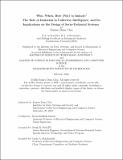Who, When, How (Not) to Imitate? The Role of Imitation in Collective Intelligence, and Its Implications on the Design of Socio-Technical Systems
Author(s)
Choi, Eunseo Dana
DownloadThesis PDF (9.481Mb)
Advisor
Hadfield-Menell, Dylan
Terms of use
Metadata
Show full item recordAbstract
Humans collectively demonstrate coordination and progress on a massive scale, building, adapting, and thriving under the rules of different institutions. Researchers posit social learning as a mechanism for overcoming individual limitations, quickly adapting to environments, passing knowledge across generations, and enabling rapid cumulative cultural evolution. This thesis demonstrates how multi-agent learning (MAL) can facilitate counterfactual experiments that shed light on the performance of different social learning. Simulations present that the details of who, when, and how to imitate affect group fitness in distinct ways based on the size and homogeneity of the group: 1. unbiased imitation works well in homogeneous groups as long as there is a minimum age for agents to be imitated; 2. imitation strategies based on models’ complete action history instead of their recent actions, although similar, can attain very different levels of group fitness; 3. very high levels of imitation probability (up to 98% in some cases) may be efficient for group learning. Results from this thesis complement and contradict accepted results from the literature. By explicitly comparing the mechanisms that govern the success or failure of group learning, findings from multi-agent learning can provide essential guidance for the design of socio-technical systems.
Date issued
2024-02Department
Massachusetts Institute of Technology. Department of Electrical Engineering and Computer Science; Massachusetts Institute of Technology. Institute for Data, Systems, and SocietyPublisher
Massachusetts Institute of Technology